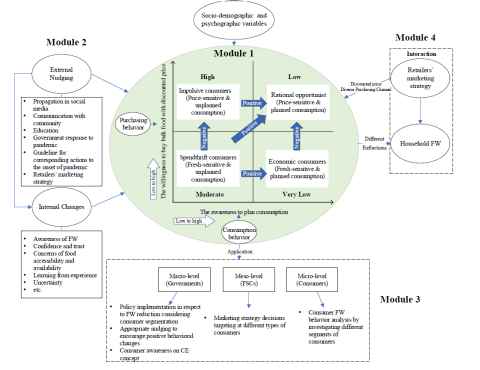Food supply chain waste reduction for a circular economy in the COVID-19 pandemic
A longitudinal study of New Zealand consumers

Food waste reduction in households is a complex problem as each household has its idiosyncrasies regarding purchasing, consumption, and wastage behaviours.
Recently, the COVID-19 pandemic, a severe trigger event, fundamentally altered consumers’
shopping and consumption patterns. The most apparent radical change was the need to stay and cook at home rather than dine out.
Owing to the concerns and perceptions of food security and accessibility arising from the pandemic, consumers sought solutions by adjusting their food purchasing and consumption behaviours.
Panic purchasing, over-ordering, and planned consumption are behaviours that occurred
with the onset of COVID-19. Using consumer segmentation, we explore our
research questions relating to wastage in households.
We conduct two studies: an online survey to explore the possible actions
influencing household food waste reduction and a longitudinal study to illustrate
the application of the conceptual model.
The study outlines are in Table 1.

Based on the data and findings from our interviews, we propose a conceptual model of consumer segmentation, presented in Figure 1.

This study provides several implications for governments, FSC practitioners, and NZ consumers.
1. Implications for governments
Our study suggests that uncertainty negatively contributes to food waste reduction by prompting consumers to panic purchasing or over-purchasing behaviours.
As mentioned by our consumer interviewees, lockdowns at short notice and rumours fuelling fears of food supply shortages heighten consumers’ anxieties and feelings of insecurity.
To reduce uncertainty, governments could establish a minimum period between the announcement of a lockdown and when it comes into effect to give people time to prepare accordingly.
Trust in the government plays a central role in avoiding over-purchasing, promoting the stability of the food supply chain (FSC), and, therefore, reducing food waste at the household level. Transparently sharing information and effectively implementing regulations are likely effective.
Quick government responses to quash unhelpful rumours help to reduce public concerns around food shortages during lockdowns. Pessimists want to be comforted, and optimists wish to know the truth. Appropriate and timely responses that counter panic purchasing by consumers are essential in helping to reduce the pressure on and fluctuations in the FSC.
2. Implications for FSC practitioners
Marketing strategies and decisions targeting different types of consumers are important for the sustainable operation of enterprises. In the context of a pandemic, how to reach out to potential consumers and expand the market are significant questions.
Consumers raised three major concerns from consumers in our interviews: distribution channels, distribution timeliness, and delivery charges.
The pandemic has hastened the growth of online shopping. Appropriately arranging the logistics and being able to expand the distribution channel in a short time is a critical issue for FSC practitioners.
Accuracy and timeliness are two critical factors impacting consumers’ purchasing behaviour. To some extent, consumers are more patient in waiting during the pandemic period in contrast with regular periods. Logistic managers in FSC could optimize the distribution network by considering the tradeoff between the consumers’ satisfaction rate and the delivery costs.
The stipulation of a minimum delivery value significantly impacts consumer purchasing behaviour and indirectly influences levels of household food waste. Since different segments of consumers have different attitudes toward free delivery, food suppliers should analyze their target market before making decisions concerning delivery thresholds.
3. Implications for consumers
Questions about effective food management during lockdowns and post-pandemic periods are important for consumers. Our investigation reveals that the experience of lockdown has different impacts on different groups of consumers. This variation of experience may either enhance or exacerbate food waste in households.
Learning from other people and through social media, and understanding different consumption behaviours, including their outcomes, are all factors that play a role in helping consumers to reduce food waste effectively.
In our investigation, over 70% of consumers responsible for food waste are only aware of their high levels of wastage once they are encouraged to evaluate their levels of waste.
Our conceptual model and analysis of consumer behavioural changes help consumers understand their behaviours and motivate them to reduce FW.
Na Luo has recently completed her PhD in operations and supply chain management and currently is a post doctoral fellow at the Centre for Supply Chain Management (CSCM).